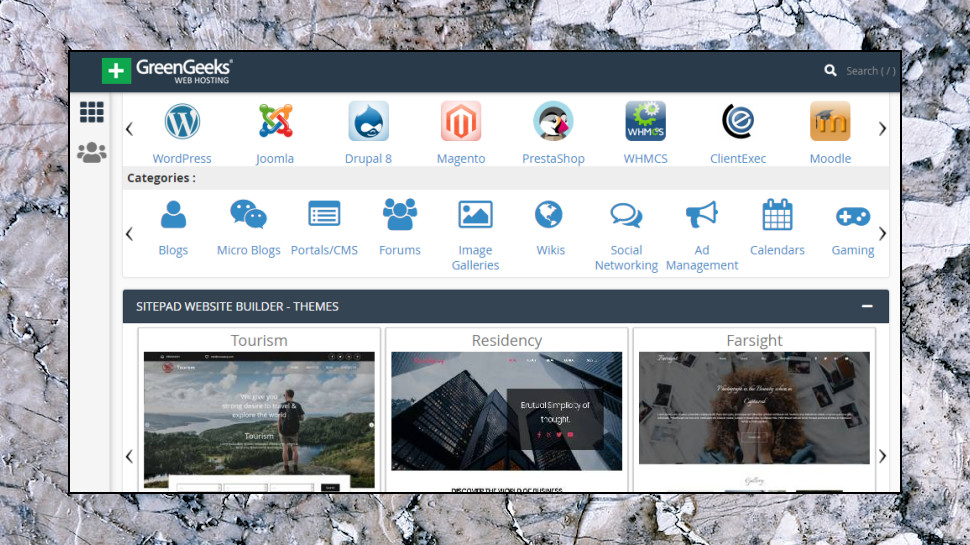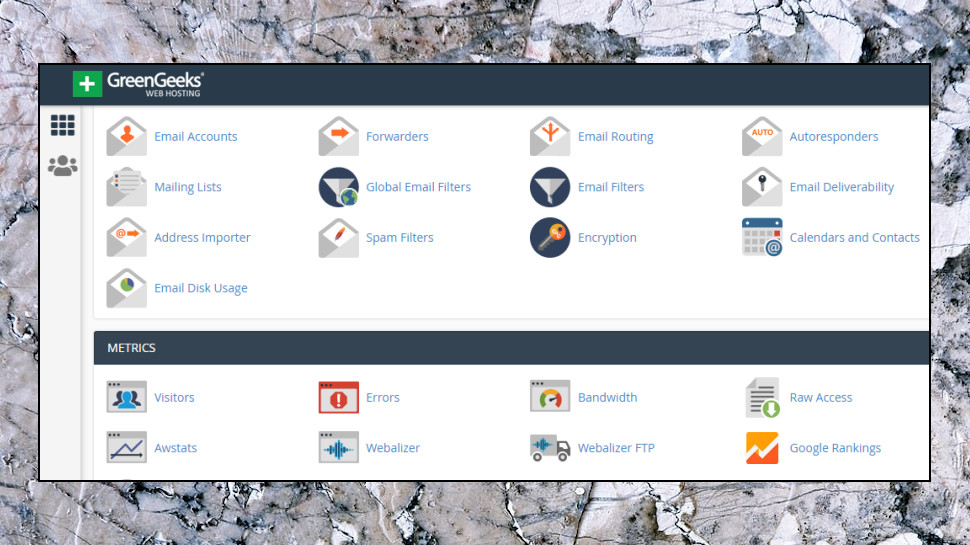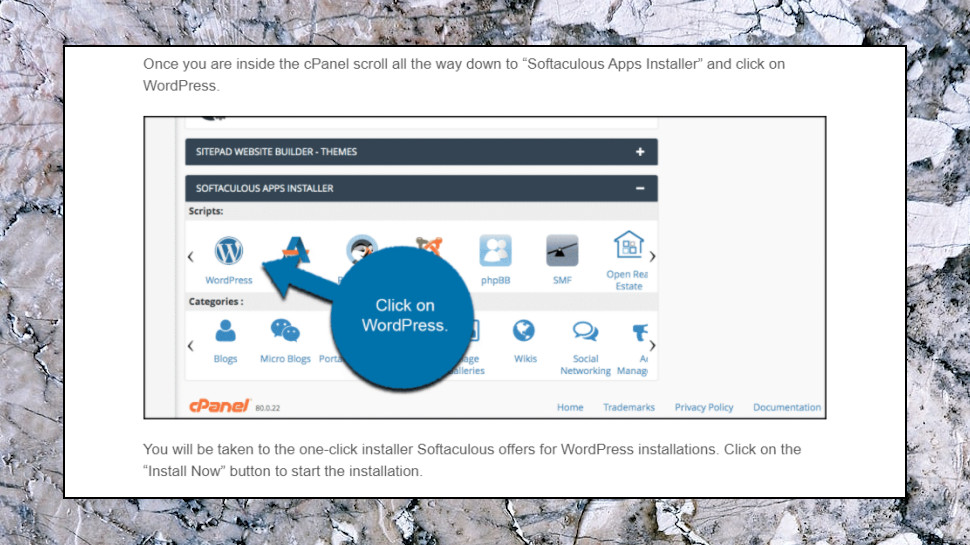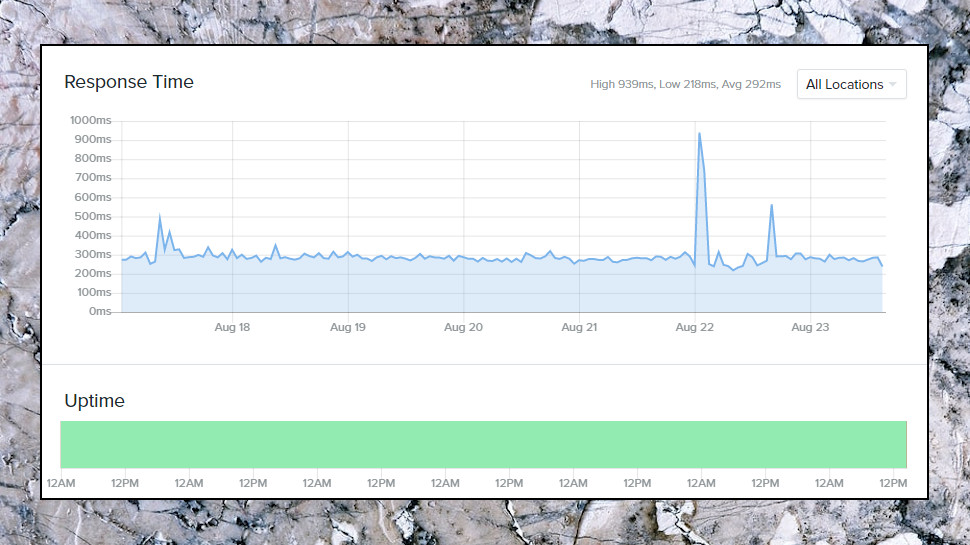Go shopping for web hosting and environmental concerns probably aren't high on your list of priorities, but maybe it's time for that to change. With more than eight million data centers around the world, they now account for 2% of the world's carbon emissions, around the same as the airline industry.
Fortunately, it doesn't have to be that way. GreenGeeks eco-friendly web hosting isn't just 'carbon neutral', the company explains, it's effectively 'carbon-reducing': 'for every amperage we pull from the grid, we invest 3 times that in the form of renewable energy via Bonneville Environmental Foundation.'
Social responsibility is great, but hosting quality is also important, and GreenGeeks gets off to a good start with its shared plans.

Even the most basic Lite plan comes with unlimited storage and bandwidth, a free website migration, a free domain registration for a year, cPanel site management, Softaculous one-click installer, unlimited subdomains, free SSL, CDN integration and a choice of five data centers (two in the US, two in Canada, one in Amsterdam.)
It's generally cheap, too, at $2.95 a month over three years, $4.95 annually or $9.95 billed monthly.
- Want to try GreenGeeks? Check out the website here
These are standard prices, so you won't be getting any nasty surprises at renewal time. (HostGator's similar Hatchling plan may be $2.75 a month for the first three years, but it jumps to $6.95 afterwards.)
Support is available 24/7/365 via email and live chat, and GreenGeeks call center is available 9:00 AM to 12 AM EST seven days a week.
Upgrading to GreenGeeks $5.95 a month Pro plan gets extra performance and support for hosting unlimited websites, while the $11.95 Premium plan ramps up speeds even further and throws in premium SSL and a dedicated IP.
The GreenGeeks website has a page on WordPress hosting, but this is just an alternative way of marketing the same shared hosting plans. It's a good baseline product, but GreenGeeks doesn't offer WordPress-optimized server caching, site staging, or the other more advanced extras you'll get with specialist WordPress plans from providers such as IONOS, Bluehost and A2 Hosting.
VPS plans are excellent value, with for example a fully managed 2GB RAM, 4 core, 50GB storage and 10TB bandwidth setup costing only $39.95 a month, billed monthly. (As with shared hosting, that's the standard fee, not a discounted price that will double or triple later.)
There are barely any configuration options, though. No budget unmanaged hosting, no choice of distro or Windows servers, no storage or RAID options, not even a choice of data centers (it's US only.) Hostwinds has similar prices but many more baseline plans and is available in managed and unmanaged, Linux and Windows types.
All shared and VPS hosting is protected by a 30-day money back guarantee. There used to be a catch in the small print which only covered cancellations 'due to the inability to deliver satisfactory services', but that's now been dropped: if you're dissatisfied with the service for any reason, you can ask for your money back.
GreenGeeks’ dedicated servers look a little more expensive, with even the entry level dual-core Intel Atom model, with just 2GB RAM, priced at $169 a month. (And there's no option to order online - you're asked to contact the sales team to find out more.)
This shouldn't necessarily be a deal-breaker, though, especially if choosing green hosting is a top priority. Using a low power CPU makes sense; GreenGeeks investment in renewable energy inevitably means there are extra costs; and although the company can't compete with the power-hungry competition on price, it's not too far way. If your conscience is more important than your cash, the servers might be worth a look.
- Also check out our complete list of the best web hosting providers
Account setup
Signing up with GreenGeeks is straightforward. Choose your preferred plan, register a domain for free (or use one you own already) and enter your contact information to create an account. Pick a payment method (card and PayPal are supported), part with your cash, and wait to have your account activated.
The GreenGeeks site explains that new accounts must go to 'internal checks' to detect fraudulent orders, and if these fail, may have to be verified by telephone. This wasn't a problem for us, though, and a very few minutes after paying, GreenGeeks activated our account and sent us a Welcome email with login details, a pointer to a Getting Started guide, and other useful information.
GreenGeeks' web account console is simple and straightforward, and makes it very easy to figure out what you're doing next. There's no scrolling through endless ads trying to persuade you to buy more stuff, as we've seen with some hosts; instead, your new hosting plan is listed at the top of the page, and there are clear links to manage the account, launch cPanel or open a support ticket. Even the greenest (joke) of hosting newbies will quickly figure out what to do next.

Creating a site
Launching cPanel from the GreenGeeks web dashboard opens a full-featured cPanel setup which provides several ways to create and manage a website.
Access to Softaculous enables quick installation of WordPress, MediaWiki, Joomla, Drupal and hundreds of other popular apps. There are more powerful auto-installers around - GoDaddy and Ionos use Installatron, which is stuffed with features - but Softaculous supports more apps, and has all the functionality most users will need.
GreenGeeks' cPanel also gives users access to the SitePad website builder. Unusually, there's not just a single launcher; cPanel also displays thumbnails of site templates in a SitePad Themes section. That's a nice touch which makes it much easier for beginners to see at a glance what SitePad can do.
Launching SitePad gets you more templates, any of which can be customized in a capable drag and drop editor. Replace the default text and images, add new page widgets (buttons, multimedia, social media links, maps, contact forms, more) and you'll have a decent site ready to go.
Unlike some other hosts, GreenGeeks doesn't limit the number of pages or the size of your SitePad website, and hope you'll pay to upgrade. You're able to add as many pages, images and other website elements as you need.
Further options include uploading your website files via FTP, or adding them manually via a browser-based file manager.

Whichever way you create a site, GreenGeeks bundles the excellent cPanel to help you manage it. Our account had a standard installation with options to view server status, create email accounts, manage databases, control security and everything else we would expect.
There are also one or two bonus options, including integration with Cloudflare CDN. This doesn't do very much – you still have to set up your account separately, all you really get is an icon which makes it easier to access your settings – but it's still a small timesaver, and we're happy to see it included in the package.
If that seems a little too complicated or time-consuming, keep in mind that GreenGeeks also offers a free website migration. That's probably not going to cover a massive web store, but if you have a simple static site or a WordPress blog, tell GreenGeeks when you sign up, and the company should be able to transfer it to your web space without you having to do anything at all.

Support
Whether you're a hosting novice or an industry expert, everyone needs a helping hand occasionally, and we were interested to check out GreenGeeks’ support options.
The website knowledgebase organizes its content into categories: 'Domains', 'Email', 'cPanel' and more. Newbies can ignore most of these for now and use a Getting Started article to walk them through the key setup tasks, and more experienced users might dip into the other topics as required.
Entering keywords in the site search box generally finds some relevant articles. We tried phrases like 'import WordPress' and 'change PHP version' and useful articles appeared high on our list of matches.
There isn't a huge amount of depth here. Choose the cPanel section, for instance, and you might hope to see advice on cPanel's most important modules. Instead, there are smaller articles on very specific tasks, which won't always interest the average user. The very first screen includes titles like 'Allowing Remote MySQL Access' and 'How Do I Change DNS for MX, CNAME, and A Records?', for instance.
Still, GreenGeeks support site probably has enough content to get your site up and running. After that you can contact the support team via live chat, ticket and email, and we've previously found its replies to be speedy and helpful.

Performance
No matter how warm and comfortable you feel about GreenGeeks' environmentally conscious hosting, it's important that it's reliable, too. No point having a website if it's not accessible when visitors need it.
We use Uptime.com to monitor availability of a test site over a seven-day period. Every five minutes, Uptime downloads the main page of our site, logging its success or failure and the server response time.
GreenGeeks managed a perfect 100% uptime, without a single outage over more than 2,000 checks. We would expect that over a short-term test, but it's by no means guaranteed. (Many hosts proudly claim they offer 99.9% uptime, and although that sounds good, 0.1% downtime still translates to around 10 minutes a week.)
GreenGeeks response time averaged a respectable 292ms. Most shared hosting plans manage around 200-400ms, so GreenGeeks is somewhere in the middle of the pack. (Keep in mind that we're benchmarking GreenGeeks cheapest hosting plans, though - upgrading may bring very different results.)
Consistency was more of a highlight. GreenGeeks' highest logged response time was a lengthy 939ms, but there were only a handful of results above 500ms. Most times hovered about 300ms, a very good performance considering the price you're paying.
Final verdict
GreenGeeks' basic and underpowered product range is a concern, but the company's full-featured shared hosting plan is good value, and the 300% power offset with renewable energy is a promise we've not seen anywhere else. This could be a smart hosting choice for eco-warriors everywhere.
- Best overall web hosting services
- Best WordPress hosting providers
- Best cloud hosting providers
- Best Linux web hosting services
- Best e-commerce hosting
- Best dedicated server hosting
- Best small business web hosting
- Best Windows hosting services
- Best managed web hosting
- Best green web hosting
- Best business web hosting
- Best colocation hosting
- Best email hosting providers
- Best VPS hosting providers
- Best web hosting resellers
from TechRadar - All the latest technology news https://ift.tt/2FRyNKC
No comments:
Post a Comment